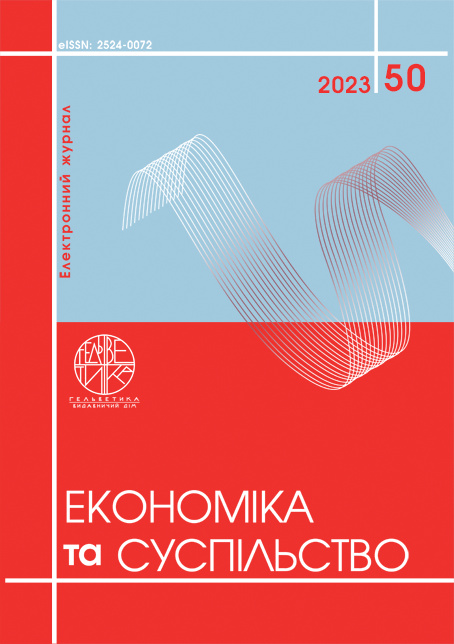CHARACTERISTICS OF THE MAIN MODELS OF HUMAN CAPITAL DEVELOPMENT MANAGEMENT
Abstract
The article clarifies the importance of human capital, which has been growing significantly in recent years, as sustainable economic growth is achieved thanks to it. Ukraine has an urgent need to develop human capital, the use of which will allow creating high-tech products with a high content of added value. Such a task can be solved on the basis of creating an effective management model for the development of human capital. Management of the development of human capital is a holistic system that involves the construction of relationships between the object and the subject of management, functioning within the external environment, with the aim of directing management action to the formation and development of a person. The conducted research made it possible to identify three main models of human capital development management: American, Japanese and Western European, which are based on the use of an innovative approach. The main advantages of the innovative approach are the desire to meet the needs of the individual with an orientation to the future, the encouragement of innovativeness, creativity, creative search, the dominance of a low degree of control and detailed management. In contrast, the domestic model of human capital development management uses a traditional approach and is characterized by such features as the use of a combination of systemic and situational approaches to management; combination of individualism with collective and group organization of work; involvement of both professionals and the owners of human capital in the management process. Unfortunately, such a model does not allow to holistically solve the problems of individual development, taking into account the needs of today. Therefore, the search for a modern effective model of human capital development management in Ukraine becomes an urgent issue, which is also due to the impossibility of ensuring effective management using traditional approaches that were developed in economic conditions that did not require innovation and creativity; the need to take into account the growing role of the individual in reproductive processes; challenges that Ukrainian society has faced recently, which significantly affected the life of an individual.
References
Грішнова О.А. Людський, інтелектуальний і соціальний капітал України: сутність взаємозв’язок, оцінка, напрями розвитку. Соціально-трудові відносини: теорія та практика. 2014. № 1. С. 34–40.
Назарко С.О., Канцур І.Г., Познанська І.В. Управління людським капіталом в умовах війни. Економіка та суспільство. 2022. № 41. С. 66–73.
Точиліна Ю.Ю. Роль людського капіталу в інноваційному розвитку національної економіки. Науковий вісник Ужгородського національного університету. Серія «Міжнародні економічні відносини та світове господарство». 2019. Вип. 26, Ч. 2. С. 88–91.
Шапошников К., Шапошникова І., Жаворонок А. Напрями підвищення конкурентоспроможності вищої освіти в сучасних умовах. Проблеми і перспективи економіки та управління. 2022. № 1(29). С. 7–13.
Becker G. Human Capital: A Theoretical and Empirical Analysis. N.Y., 1964.
Derii Z., Zosymenko T., Shaposhnykov K., Tochylina Y., Krylov D., Papaika O. The Influence of Human Capital on GDP Dynamics: Modeling in the COVID-19 Conditions. IJCSNS International Journal of Computer Science and Network Security. 2022. Vol. 22. No. 3. Рр. 67–76.
European innovation scoreboard. URL: https://research-and-innovation.ec.europa.eu/statistics/performance-indicators/european-innovation-scoreboard_en
Global Innovation Index 2021. URL: https://www.wipo.int/edocs/pubdocs/en/wipo-pub-2000-2022-en-main-report-global-innovation-index-2022-15th-edition.pdf
Human development report 2021/2022. URL: https://hdr.undp.org/system/files/documents/global-report-document/hdr2021-22pdf_1.pdf
Hrishnova O.A. (2014). Liudskyi, intelektualnyi i sotsialnyi kapital Ukrainy: sutnist vzaiemozviazok, otsinka, napriamy rozvytku. [Human, intellectual and social capital of Ukraine: the essence of relationships, assessment, directions of development]. Sotsialno-trudovi vidnosyny: teoriia ta praktyka – Social and labor relations: theory and practice. Vol. 1. Pp. 34–40.
Nazarko S.O., Kantsur I.H., Poznanska I.V. (2022). Upravlinnia liudskym kapitalom v umovakh viiny. [Management of human capital in conditions of war]. Ekonomika ta suspilstvo – Economy and society. Vol. 41. Pp. 66–73.
Tochylina Yu.Yu. (2019). Rol liudskoho kapitalu v innovatsiinomu rozvytku natsionalnoi ekonomiky. [The role of human capital in the innovative development of the national economy]. Naukovyi visnyk Uzhhorodskoho natsionalnoho universytetu. Seriia «Mizhnarodni ekonomichni vidnosyny ta svitove hospodarstvo» – Scientific Bulletin of the Uzhhorod National University. Series "International Economic Relations and World Economy". Vol. 26, Ch. 2. Pp. 88–91.
Shaposhnykov K., Shaposhnykova I., Zhavoronok A. (2022). Napriamy pidvyshchennia konkurentospromozhnosti vyshchoi osvity v suchasnykh umovakh. [Directions of increasing the competitiveness of higher education in modern conditions]. Problemy i perspektyvy ekonomiky ta upravlinnia – Problems and prospects of economics and management. Vol. 1(29). Pp. 7–13.
Becker G. (1964). Human Capital: A Theoretical and Empirical Analysis. N.Y.
Derii Z., Zosymenko T., Shaposhnykov K., Tochylina Y., Krylov D., Papaika O. (2022). The Influence of Human Capital on GDP Dynamics: Modeling in the COVID-19 Conditions. IJCSNS International Journal of Computer Science and Network Security. Vol. 22. No. 3. Рр. 67–76.
European innovation scoreboard. Available at: https://research-and-innovation.ec.europa.eu/statistics/performance-indicators/european-innovation-scoreboard_en
Global Innovation Index 2021. Available at: https://www.wipo.int/edocs/pubdocs/en/wipo-pub-2000-2022-en-main-report-global-innovation-index-2022-15th-edition.pdf
Human development report 2021/2022. Available at: https://hdr.undp.org/system/files/documents/global-report-document/hdr2021-22pdf_1.pdf

This work is licensed under a Creative Commons Attribution 4.0 International License.


